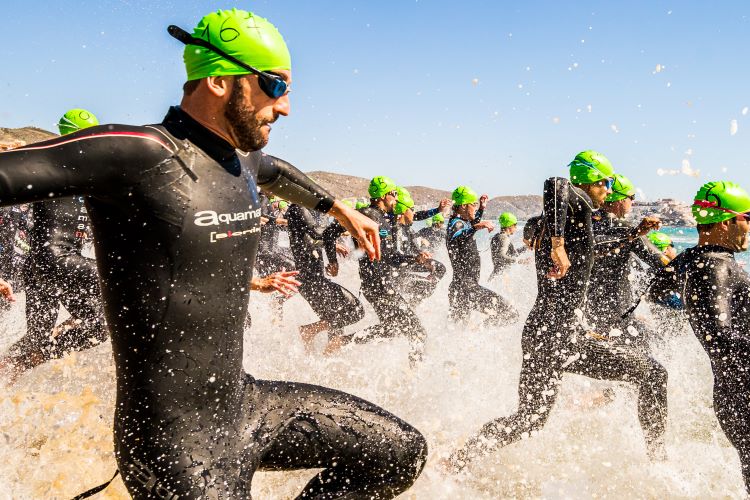We test the best triathlon kit for beginners so you can swim, bike and run better.
Although the triathlon season is well under way, and the Olympic medals already decided, it’s not too late to target which events to compete in. With big events like the supertri London hitting the capital next month, there’s still plenty of triathlon inspiration to be found.
By simultaneously training for the three most popular cardiovascular pursuits – swimming, cycling and running – dipping your toe into the world of triathlon will test your physical and mental strength in entirely new ways. To succeed, though, you will need to invest in some of the best triathlon kit for beginners. There are three essential items: a wetsuit, bike and pair of running shoes.
But like any sport, triathlon has a seemingly never-ending list of specialist options – all designed, ultimately, to make you faster, whether that’s improving your aerodynamics while racing, or helping you to shave time off transitions between the three disciplines. The best triathlon kit for beginners will help you make small gains in your swim, bike and run, and allow you to enjoy your new sport to the fullest.
RELATED CONTENT:
This is the best triathlon kit for beginners
(Keep scrolling for full reviews…)
- Garmin Forerunner 955 Solar ($599.99 / £549.99)
- DHB Aeron Lab Short Sleeve Tri Suit ($218 / £200)
- Aqua Sphere Kayenne Polarized ($49 / £36)
- Hunt 50 Carbon Aero Disc Wheelset ($949 / £749)
- Roka Maverick Wetsuit ($295 / £295)
- HUUB Transition Rucksack (£89.99 / international shipping available)
- Profile Design Sonic Ergo 35a Aluminium Clip-On Aerobar (£139.99 / not currently available in the US)
- Zone3 Ultimate Race Number Belt ($10 / £7.50)
Garmin Forerunner 955 Solar
BUY IT NOW:
$599.99 / £549.99, garmin.com
PROS:
- Useful features for racing and training
- Solar charging boosts battery life
- Heart rate tracking for swimming
CONS:
- High price
- Built-in heart rate monitor not as accurate as a chest strap
- Fiddly to import custom workouts
A triathlon watch might not seem like it should make the best triathlon kit for beginners list – an event’s tracker can tell you your finishing time, after all – but it’s incredibly handy both during and in the build-up to race day.
The Garmin Forerunner 955 Solar comes with an eye-watering price tag, but it easily earns its place on your wrist. It can guide and track every workout session in the build-up to an event; its built-in heart rate monitor allows you to keep an eye on efforts mid-race (and ensure you didn’t go off too hard); and its Garmin Connect smartphone app is great for post-race analysis, and seeing where you can shave seconds off next time.
Outside of training and competing, the Forerunner 955 functions similarly to any other high-end smartwatch – including the ability to make contactless payments via GarminPay.
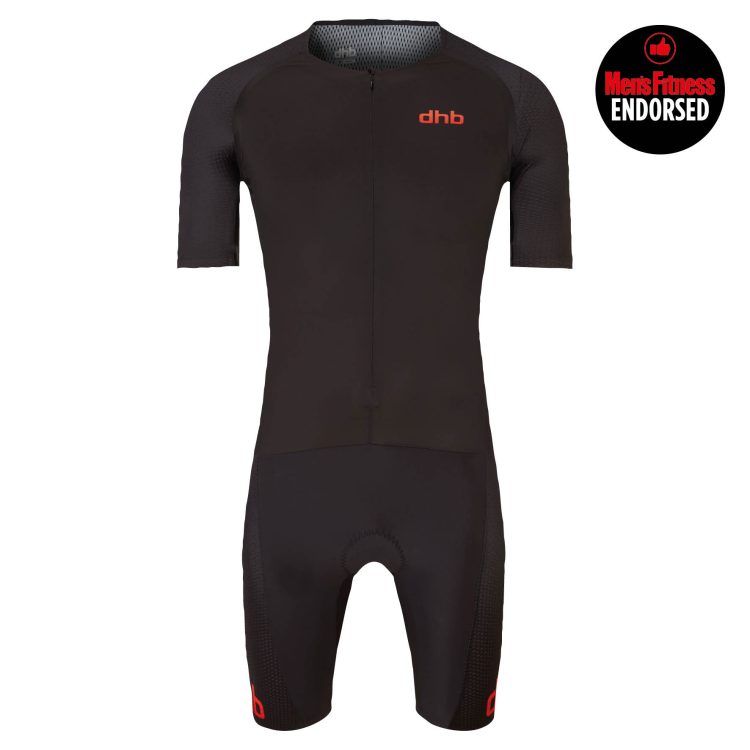
DHB Aeron Lab Short Sleeve Tri Suit
BUY IT NOW:
$218 / £200, wiggle.co.uk
PROS:
- Aerodynamic fit
- Three rear pockets are useful for long-distance races
- Comfortable under wetsuit
CONS:
- Lightweight design makes it a summer-only tri suit
- Construction feels slightly cheap for the cost
- Chamois could be thicker
This tri-suit from Wiggle’s in-house clothing brand might look like a stitched-together cycling jersey and set of bib shorts, but there are some key differences. Designed to be worn under a wetsuit, the arms allow for rotation while swimming, and its water-repellent coating prevents it from becoming
a soggy weight.
On the bike, a thin chamois provides some welcome padding, but is subtle enough not to get in the way when running. A slim, aerodynamic profile helps to slice through the air without being restrictive. It’s practical, too, with three rear pockets providing you with ample storage for longer races and training rides.
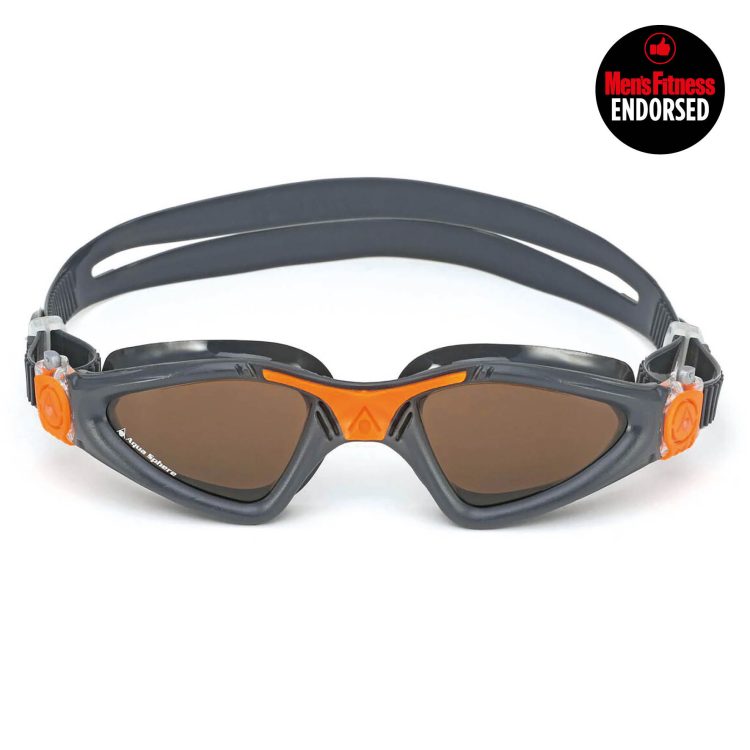
Aqua Sphere Kayenne Polarized
BUY IT NOW:
$49 / £36, uk.aquasphereswim.com
PROS:
- Leak-free
- Ideal for open water and pool
- Polarized lenses are helpful in sunny conditions
CONS:
- Leaves marks around the eyes
- Large design can feel cumbersome
The swimming leg of most triathlons will see you take to the open water. It can be quite an intimidating place to the uninitiated, as your starting wave becomes a sea of flailing arms and legs for five minutes before the pack naturally strings out. These Kayenne goggles from Aqua Sphere help to keep you in control during the chaos.
The goggles’ oversized lenses provide 180 degrees of vision – ensuring you can see another competitor’s leg in your peripheral vision and take evasive action before getting a foot in the face. The polarized lenses also keep things crystal clear, and prevent the sun’s glare from sending you off course when navigating with your head above the water.

Hunt 50 Carbon Aero Disc Wheelset
BUY IT NOW:
$949 / £749, huntbikewheels.com
PROS:
- Great all-round wheelset for racing and training
- Compatible with most modern road bikes
- Very good price for carbon wheelset
CONS:
- Not compatible with older rim brake bikes
- Deep rims are harder to handle in strong winds
- Tubeless set-up doesn’t solve race-ending punctures
Another way to improve your cycling time is by swapping out your stock wheels. Unless you’re riding around on a £2,000-plus road bike, there’s a good chance that your wheels are fairly basic. But you don’t have to remortgage the house to get a faster and more aerodynamic set.
While not strictly triathlon-focused, the 50 Carbon Aero Disc from Hunt are tough to beat on price and performance. Their 50mm-deep rims reduce turbulence and therefore drag compared to shallower models, enabling you to maintain speed even when not pedalling. They’re suitable
for everyday training, too, but be warned: deep rims act like sails in strong crosswinds, so they’ll increase your speed, but require good bike handling skills.
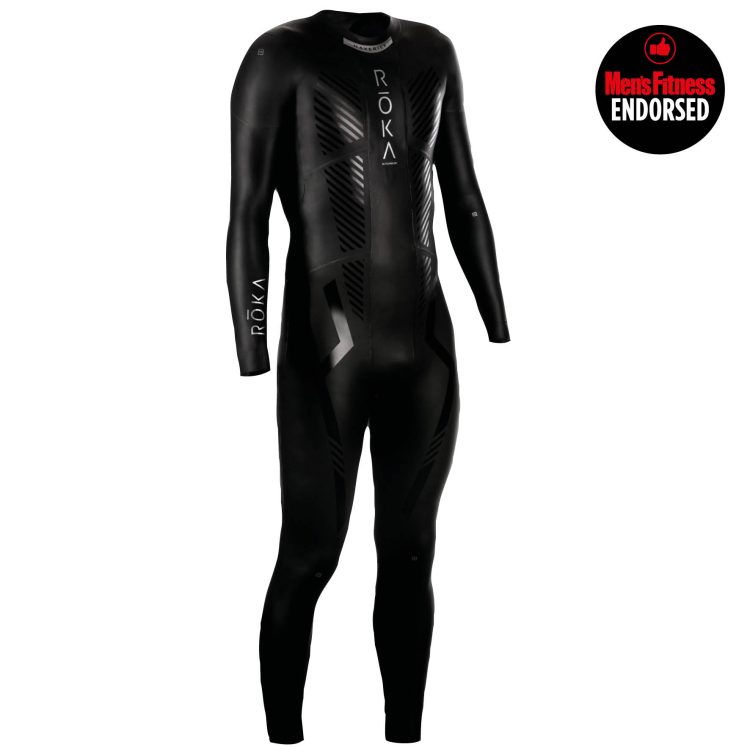
Roka Maverick Wetsuit
BUY IT NOW:
$295 / £295, roka.com
PROS:
- Durable
- Chafe-free neckline
- Good range of sizes
CONS:
- Buoyancy could be better for a beginner wetsuit
- Cheaper entry-level suits are available
A wetsuit is a must for most triathlons, and most event organisers will insist you wear one for safety due to its added buoyancy. But that doesn’t mean you have to settle for a bog-standard option. The Maverick range from Roka tops out at the £1,000-plus ‘X2’, but its entry-level model is ideal whether you’re just getting started or looking to upgrade.
Its construction is focused on improving arm mobility and preventing lower-body sinking, minimising fatigue and drag to keep your front crawl fluid and efficient. While it’s made from a slightly cheaper neoprene, that makes it durable and you won’t have to worry about accidental tears – particularly during the transition, when care goes out of the window in pursuit of speed.
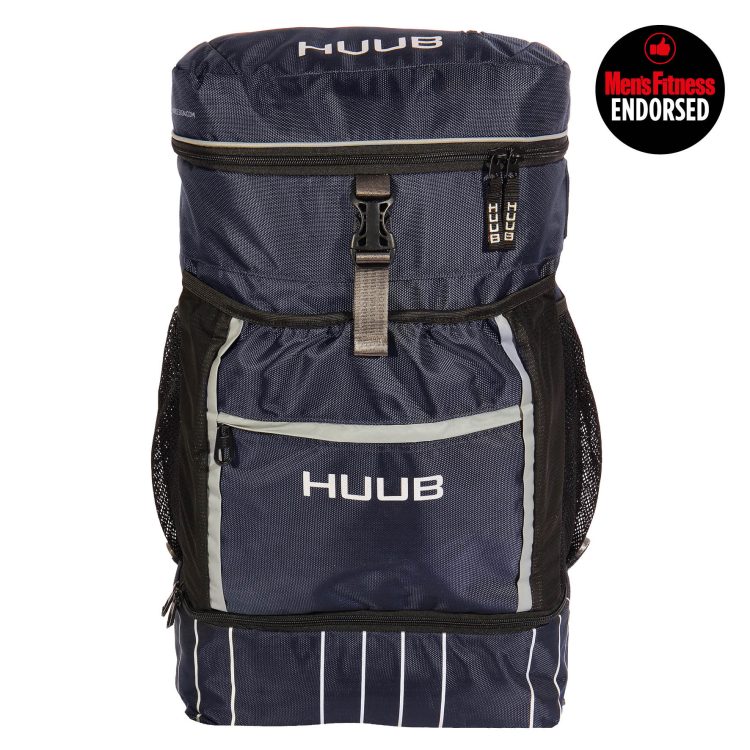
HUUB Transition Rucksack
BUY IT NOW:
£89.99, huubdesign.com (international shipping available)
PROS:
- Large capacity means it can store all race-day kit
- Compartments make it easy to find things mid-transition
- Comfortable straps for carrying heavy loads
CONS:
- Any large rucksack could perform a similar function
- A ‘nice to have’ rather than essential
- Cheaper alternatives are available
A triathlon sees you use a lot of clothing and kit. In addition to the obvious (wetsuit, bike, helmet, two pairs of shoes), there is a seemingly endless amount of gear you’ll need before, during and after a race, and keeping it organised and in one place requires military precision. While not essential, the HUUB Transition Rucksack can take a lot of guesswork out of the equation.
The 40-litre bag has a compartment for every occasion (waterproof storage for wetsuit and towel, separate helmet compartment) and its numerous pockets will minimise any pre-race panicking when you can’t find where you’ve put your earplugs or talc for your running shoes. Its padded straps make
it comfortable to wear, too, and it even features a reflective trim, to keep you safe and seen on your after-dark rides to the pool.
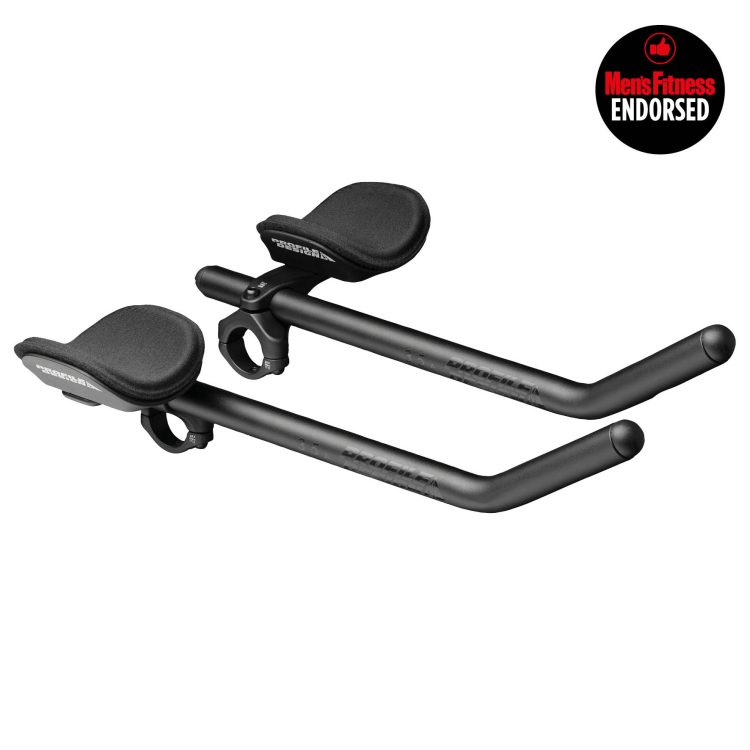
Profile Design Sonic Ergo 35a Aluminium Clip-On Aerobar
BUY IT NOW:
£139.99, profile-design-eu.com (not currently available in the US)
PROS:
- Cost-effective way to hold an aerodynamic position
- Great scope for adjustments
- Can fit aero bar gear shifters
CONS:
- Weightier than carbon fibre alternative
- Pads could be more comfortable
Rather than forking out for a specialist triathlon bike – that you will only use a handful of times a year – it’s possible to transform a normal road bike into an air-cheating machine. The cheapest way of doing so is to look at your own on-bike aerodynamics – by making yourself as small as possible, drag is reduced and you can dramatically increase your speed for the same level of effort. Clip-on aero bars will take things up a gear.
A favourite of triathlon athletes and time trial cyclists, they are essentially two poles that are fixed to a standard set of handlebars. When riding with your arms resting on the bars, your body takes a much more narrow form, allowing you to cut through the air and ride more efficiently. This set from Profile Design can be tweaked and finessed to help you get the most comfortable position, and it’s simple to install.
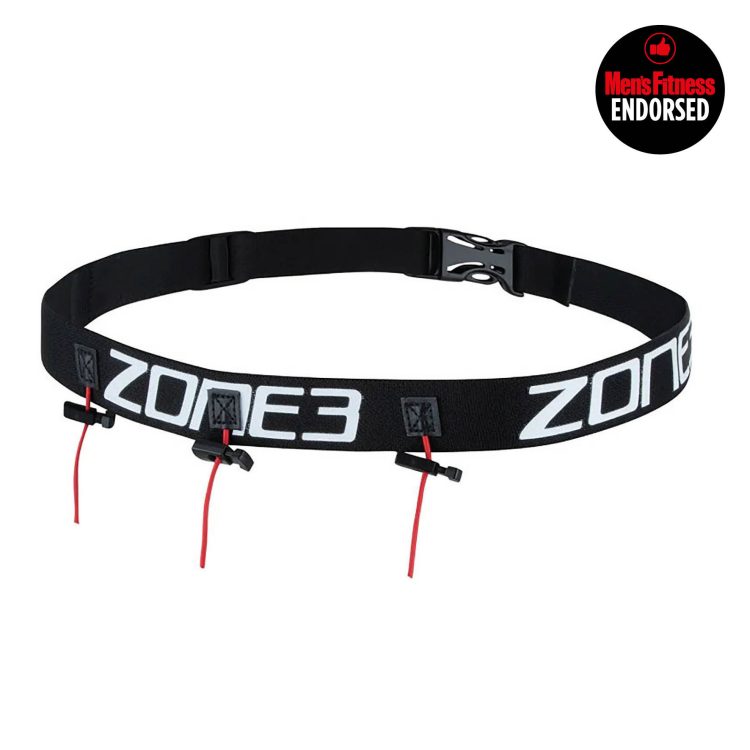
Zone3 Ultimate Race Number Belt
BUY IT NOW:
$10 / £7.50, zone3.com
PROS:
- Inexpensive time-saving tool
- Can be worn under a wetsuit
- Prevents tears to tri suit from race number pins
CONS:
- Three nutrition loops might not be enough for long-distance events
- Race number flaps when cycling
- Limited use outside of racing
Not all time-saving triathlon tools are expensive, as this race number belt from Zone3 proves. At less than £10, it might be the most cost-effective bit of kit around.
The concept is simple. During a race, you have to display your race number on your back during the cycle and your front for the run, but instead of wasting time in the second transition swapping around your race number, attach your number to a race belt and you can spin it from back to front on the move. This model also includes three handy loops that can securely hold gels, making sure you keep your energy levels topped up throughout the race.

